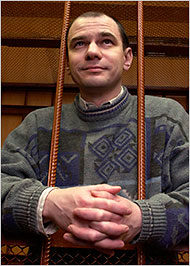
MOSCOW — The mother of a Russian scientist convicted of spying for the United States said Wednesday that her son had been moved to Moscow from a penal colony in preparation for a possible trade involving the Russian spy suspects detained last month in the United States.
The scientist’s lawyer and colleagues confirmed the woman’s account, according to Russian news agencies, but the Russian authorities had no immediate comment.
The scientist, Igor Sutyagin, was arrested in 1999 and accused of passing secrets about nuclear submarines and missile warning systems to a British company that prosecutors said was a front for the C.I.A. Mr. Sutyagin, who was convicted in 2004 and sentenced to 15 years in prison, had maintained his innocence.
In an interview, Mr. Sutyagin’s mother, Svetlana E. Sutyagina, said he had been transferred to Moscow and that she had met with him on Wednesday morning.
“He said they made him sign a confession of guilt and that there was not much time, as they should accuse those detained in America tomorrow,” Ms. Sutyagina said. Her son, whom she described as bearded and thin from his time in prison, is to be pardoned and sent to Vienna, she said, adding that from there he is to be handed over to the British government.
“He doesn’t know how this trade will take place,” she said. “All he knows is he is being sent to Vienna, and there he will meet the English. It’s formulated as a pardon. That’s all.”
Mr. Sutyagin’s lawyer, Anna Stavitskaya, a prominent Moscow human rights lawyer, said he would be swapped for one of the Russians accused in the United States of failing to register as an agent for a foreign government, the Interfax news agency reported.
“They are going to swap him, among others, for those who have been detained in America,” Ms. Stavitskaya said.
Separately, the news agency cited the executive secretary of the Public Committee in Defense of Scientists, a rights organization, Ernst Chyorny, as saying that Mr. Sutyagin had been transferred to Moscow in anticipation of a trade.
“A decision has been made to deport him to Britain in exchange for some people whom Russia needs more than Sutyagin,” Mr. Chyorny was quoted as saying. The report did not clarify how Mr. Chyorny had learned of the transfer or trade.
Mr. Sutyagin had been held in a prison in the Arkhangelsk region, about 600 miles north of Moscow, according to a colleague interviewed by the Russian news media.
Sergei A. Guskov, a spokesman for Russia’s Foreign Intelligence Service, a successor agency to the K.G.B., said he was aware of the reports but would not comment on them.
The public discussions about a trade involving Mr. Sutyagin in Moscow on Wednesday came as American prosecutors in New York were in talks with the lawyers for the recently arrested spy suspects for a rapid resolution of the case, according to people who had been briefed on the discussions. These talks, the people said, could lead to deportations or agreements to return to Russia rather than prison time.
Mr. Sutyagin was arrested during a string of detentions of Russian scientists in the late 1990s and early part of this decade, on accusations of selling military or scientific secrets to American and other foreign intelligence agencies. After the fall of the Soviet Union and the shrinking of state subsidies for science, many scientists found work in research and other activities for foreign companies.
Mr. Sutyagin, an arms control researcher working for the Institute of U.S.A. and Canada, a research group in Moscow, had argued during his trial that he could not be convicted of espionage as he had no access to state secrets.
Human rights organizations at the time criticized Mr. Sutyagin’s prosecution, saying it suggested a Soviet-style wariness of contacts between Russian scientists and foreigners on the part of the security services, rather than success in arresting a foreign agent. On Wednesday, Ms. Sutyagina said that her son had an appeal pending before the European Court of Human Rights in Strasbourg, but that he was compelled to abandon it by signing an admission of his guilt.